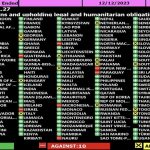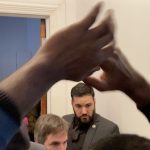Russian dissident Boris Kagarlitsky has been released from detention. His release comes several weeks after Canadian professor Radhika Desai asked Russian President Vladimir Putin to look into Kagarlitsky’s case.
This past summer, a court in the northwestern Russian city of Syktyvkar sent Kagarlitsky to pretrial detention on a charge of making online calls for terrorism. The charge stemmed from Kagarlitsky’s online comments in October 2022 on reports about a Ukrainian attack on the massive Kerch bridge, built by Moscow after Russia annexed Crimea in 2014.
Desai travels to Russia
In early October, while Kagarlitsky remained in detention, Desai travelled to Moscow with her partner, Professor Alan Freeman, to attend a major conference organized by the Valdai Discussion Club, a prestigious Russian think tank.
Shortly prior to their departure for Russia, the Canadian government added the Valdai Discussion Club to its list of sanctioned Russian entities. Desai and Freeman nonetheless decided to attend the conference.
At the end of the conference, Russia President Vladimir Putin delivered a keynote speech. During the extensive Q&A which followed his speech, Desai was afforded the opportunity to ask Russia’s President two questions.
Desai’s intervention
Desai’s first question sought Putin’s reaction to an international scandal that had just engulfed Canada’s Parliament.
On September 22, during a visit to Ottawa by Ukrainian President Volodymyr Zelensky, Parliamentarians and Zelensky gave two standing ovations to a former Waffen SS member, Yaroslav Hunka. Parliament’s former Speaker, Antony Rota, introduced Hunka as a Ukrainian veteran who had fought “against the Russians” in the Second World War.
Putin’s response to Desai’s first question was scathing. He said that Rota was an “idiot” if he didn’t understand that a veteran who fought against Russia during the Second World War fought on the side of the Nazis. He added that, if the Speaker did know this and called Hunka a hero anyway, “he’s a bastard.” Putin also remarked that the incident showed “the kind of people we have to deal with … in certain Western countries.”
Desai’s second question to Putin related to Kagarlitsky. Desai began her question by describing it as a “personal appeal” about which she felt “very strongly”. Describing Kagarlitsky as a “dear friend”, Desai said that Kagarlitsky had been detained in Russia, and that she and other friends of his “are very worried about his personal welfare”.
Desai then explained that she was making this appeal despite her disagreements with Kagarlitsky’s criticisms of the Russian government. Desai concluded her appeal by asking Putin to read a letter that she and others had written in regard to Kagarlitsky’s detention.
Putin responded to Desai by indicating that he “hadn’t gone into the personal details of Mr. Kagarlitsky”, but that he would read Desai’s letter and react to it. “I promise”, he said.
A video of the complete exchange between Desai and Putin appears at the end of this article.
Who is Boris Kagarlitsky?
Boris Kagarlitsky is one of the most prominent left-wing sociologists in Russia. He has been a vigorous critic not only of Putin’s government, but of prior Russian and Soviet governments as well.
Kagarlitsky was arrested for ‘anti-Soviet’ activities in 1982, then pardoned and released the following year.
He was arrested again in 1993 for his opposition to then Russian President Boris Yeltsin during Russia’s September-October constitutional crisis.
In March of this year, Canadian Dimension published an op-ed by Kagarlitsky in which he condemned Russia’s invasion of Ukraine. In it, he argued that Western leftists should call for a peaceful settlement of the war only on condition that Russian forces withdraw from all territory that they did not occupy before the invasion of February 2022. “This”, he wrote, “would be a defeat for the [Putin] regime so serious as to hasten its inevitable demise.”
In April, Canadian Dimension published a response to Kagarlitsky’s op-ed, written by prominent Canadian leftists Sam Gindin and David Mandel. Gindin and Mandel described Kagarlitsky’s analysis as “remarkably shallow”, but acknowledged that his analysis “resonates even with some sections of the Western left”. They continued:
These sections of the left lament the distant horrors of war suffered by others but they support, in fact, pursuit of war by NATO and Ukraine and—at least “for now”—the rejection of diplomacy. They blithely refuse to face reality (obvious to all except mainstream, pro-NATO media and some of its politicians) while others just don’t care, since their professed goal is to weaken Russia, and to hell with the people of Ukraine—that there is no sense in which Kyiv can win this war, or even fight itself into a better bargaining position.
We are witnessing an historic disgrace of these alleged fighters for sanity, justice, and socialism.
What will the Canadian media do with this story now?
When news broke that Desai had attended the Valdai conference and had asked Putin about the recent travesty in Canada’s Parliament, Canada’s national broadcaster pounced.
Citing warmongers and neocons from the Canadian punditry, the CBC declared that Desai was “under fire” for having attended the conference, and for having asked Putin about Nazi-gate.
The CBC gave particular prominence to Marcus Kolga of the right-wing Macdonald Laurier Institute. I have previously exposed Kolga as a fraudulent ‘disinformation expert’ who works in the service of the defence industry,
Kolga told the CBC that the Valdai conference “is basically a Putin-curated, Kremlin-curated propaganda-fest” that has “descended into a cesspool of Russian disinformation.”
None of the three articles published by the CBC about the Desai affair mentioned Desai’s question to Putin about Boris Kagarlitsky.
The harsh narrative of the CBC’s three articles was that, whether wittingly or unwittingly, Desai was helping Putin to disseminate Russian disinformation, but Desai’s question to Putin about Kagarlistky directly contradicted that narrative. Therefore, the CBC’s failure to mention Desai’s question about Kagarlistky was either bad faith or journalistic malpractice (or both).
Now that Kagarlitsky has been released, it will be interesting to see whether the CBC will belatedly cover this aspect of the Desai affair. I have provided a copy of this article to the authors of the CBC’s articles (Karen Pauls and Briar Stewart) to ensure that they are aware of Kagarlitsky’s release. Ms. Stewart has acknowledged her receipt of this article.
You can watch and listen to the complete exchange between Desai and Putin here:






Thank you very much for posting the Putin q and a video on YouTube, where Putin gives his opinion of our Canadian so called leaders.
Could you also post it on Twitter X?
Thank you and Seasons Greetings